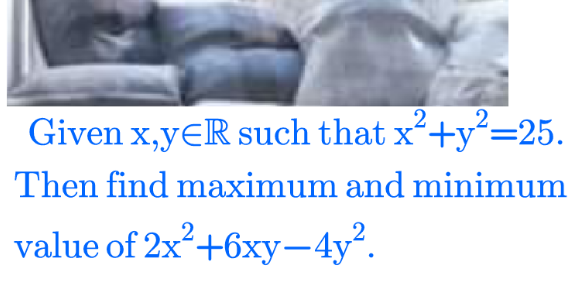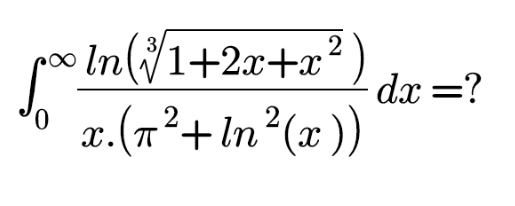
Question and Answers Forum
DifferentiationQuestion and Answers: Page 16






|
Question and Answers Forum |
DifferentiationQuestion and Answers: Page 16 |
| Ω :=∫_0 ^( ∞) (( e^( −x^( 3) ) . sin (x^( 3) ))/x)dx= ((ζ (2 ))/2) m.n... |

|

|
| prove that .... 𝛗:=∫_0 ^( 1) (( x. ln^( 2) ( 1+ x ))/(1 + x^( 2) )) dx =(1/(96)) ln(2 ) ( π^( 2) + 4 ln^( 2) (2 ))....■ M.N.. |
| If x^2 +y^2 = 1 then find the maximum value of x^2 +4xy−y^2 . |

|
| 𝛗 := ∫_0 ^( ∞) (( cos (x ).cosh (x ))/(cosh (πx )))dx=? |
| prove that.. csch (x)= (1/x) + Σ_(n=1) ^∞ ((2.(−1)^( n) x)/(n^( 2) π^( 2) + x^( 2) )) then find: Ω := ∫_0 ^( ∞) ((cosh (x )−(1/x))/x) dx=−ln(2)....■ |
| (√(3+(√(6+(√(9+...+(√(96+(√(99)))))))))) = ? |
| x , y ∈ R & sin(x )+ cos (y ) =1 then max ( sin(y) + cos (x) ) =? .... |
| nice...calculus 𝛗 := ∫_0 ^( (π/2)) x^( 3) . cot (x )dx =(a/(16)) a :=? m.n... |
| If x , y > 1 : Min ( (( x^( 4) )/((y −1 )^( 2) )) + (( y^( 4) )/(( x − 1 )^( 2) )) ) = ? ......■ ? m.n... |

|
| 1. prove that : ∫_0 ^( ∞) (( e^( t) .ln(t ))/((1 + e^( t) )^( 2) )) dt=(1/2)(ln((π/2) )− γ ) |

|
| show that.... F := ∫_0 ^( ∞) (( sin^( 4) (x^( 2) ) )/x^( 2) ) dx = (1/8) ( 4 − (√2) )(√π) .....■ ...m.n... |
| Find maximum value of function α(x)= (√(2x)) +(√(16−x)) +(√(35+x)) . |

|
| ∫_0 ^( ∞) (( arctan((x/2))+arctan(2x))/(x^( 2) +1))=^? (π^( 2) /4) |
| solve.... Q := ∫_0 ^( 1) ln (x ). ln ( 2− x )dx =? ...........■ m.n.1970... |
| Given x ,y real number such that 0<(y/x)<(1/2). Find minimum value of ((2y)/(x−y)) +((3x)/(x+2y)) . |
| ∫_0 ^( ∞) (( sin^( 2) (x ))/(x(√x))) dx=^? (√π) |
| Prove That :: I := ∫_0 ^( ∞) ((( sin (x ).cos (x ))^( 4) )/(x . (√x) ))dx=(1/(32)) (2 (√2) −1 )(√( π)) ....■ ..m.n.. |
| prove :: Ω:=∫_0 ^( ∞) e^(−(√x)) .ln ((( x))^(1/4) )=^? 1−γ m.n.. |
| The function f(x)=e^x +x being differentiable and one to one , has a differentiable inverse f^(−1) (x). The value of (d/dx) (f^(−1) ) at point f(ln 2) is __ |
| Let g is the inverse function of f and f ′(x)=(x^(10) /(1+x^2 )). If g(2)= a then g ′(2) =__ |